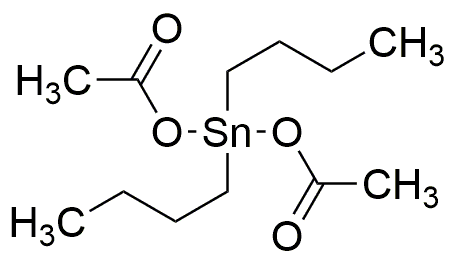Dibutyltin diacetate is widely utilized in research focused on various applications:
- Polymer Production: It acts as a catalyst in the production of polyurethanes and polyesters, enhancing the efficiency of polymerization processes.
- Coating Formulations: Commonly used in the formulation of antifouling paints, it helps in preventing the growth of marine organisms on ships and underwater structures.
- Biocidal Applications: Its biocidal properties make it effective in preserving wood and other materials against fungal and bacterial degradation.
- Pharmaceutical Research: Employed in the synthesis of organotin compounds, it aids in the development of new drugs and therapeutic agents.
- Analytical Chemistry: Utilized as a reagent in various analytical methods, it helps in the detection and quantification of specific compounds in complex mixtures.
General Information
Properties
Safety and Regulations
Applications
Dibutyltin diacetate is widely utilized in research focused on various applications:
- Polymer Production: It acts as a catalyst in the production of polyurethanes and polyesters, enhancing the efficiency of polymerization processes.
- Coating Formulations: Commonly used in the formulation of antifouling paints, it helps in preventing the growth of marine organisms on ships and underwater structures.
- Biocidal Applications: Its biocidal properties make it effective in preserving wood and other materials against fungal and bacterial degradation.
- Pharmaceutical Research: Employed in the synthesis of organotin compounds, it aids in the development of new drugs and therapeutic agents.
- Analytical Chemistry: Utilized as a reagent in various analytical methods, it helps in the detection and quantification of specific compounds in complex mixtures.
Documents
Safety Data Sheets (SDS)
The SDS provides comprehensive safety information on handling, storage, and disposal of the product.
Product Specification (PS)
The PS provides a comprehensive breakdown of the product’s properties, including chemical composition, physical state, purity, and storage requirements. It also details acceptable quality ranges and the product's intended applications.
Certificates of Analysis (COA)
Search for Certificates of Analysis (COA) by entering the products Lot Number. Lot and Batch Numbers can be found on a product’s label following the words ‘Lot’ or ‘Batch’.
Numéro de catalogue
Numéro de lot/série
Certificates Of Origin (COO)
This COO confirms the country where the product was manufactured, and also details the materials and components used in it and whether it is derived from natural, synthetic, or other specific sources. This certificate may be required for customs, trade, and regulatory compliance.
Numéro de catalogue
Numéro de lot/série
Safety Data Sheets (SDS)
The SDS provides comprehensive safety information on handling, storage, and disposal of the product.
DownloadProduct Specification (PS)
The PS provides a comprehensive breakdown of the product’s properties, including chemical composition, physical state, purity, and storage requirements. It also details acceptable quality ranges and the product's intended applications.
DownloadCertificates of Analysis (COA)
Search for Certificates of Analysis (COA) by entering the products Lot Number. Lot and Batch Numbers can be found on a product’s label following the words ‘Lot’ or ‘Batch’.
Numéro de catalogue
Numéro de lot/série
Certificates Of Origin (COO)
This COO confirms the country where the product was manufactured, and also details the materials and components used in it and whether it is derived from natural, synthetic, or other specific sources. This certificate may be required for customs, trade, and regulatory compliance.


